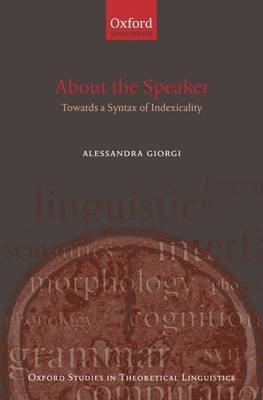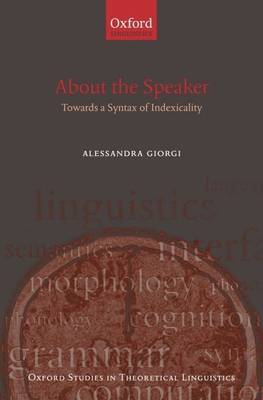
Door een staking bij bpost kan je online bestelling op dit moment iets langer onderweg zijn dan voorzien. Dringend iets nodig? Onze winkels ontvangen jou met open armen!
- Afhalen na 1 uur in een winkel met voorraad
- Gratis thuislevering in België vanaf € 30
- Ruim aanbod met 7 miljoen producten
Door een staking bij bpost kan je online bestelling op dit moment iets langer onderweg zijn dan voorzien. Dringend iets nodig? Onze winkels ontvangen jou met open armen!
- Afhalen na 1 uur in een winkel met voorraad
- Gratis thuislevering in België vanaf € 30
- Ruim aanbod met 7 miljoen producten
Zoeken
€ 148,95
+ 297 punten
Uitvoering
Omschrijving
This book considers the semantic and syntactic nature of indexicals - linguistic expressions, as in I, you, this, that, yesterday, tomorrow, whose reference shifts from utterance to utterance.There is a long-standing controversy as to whether the semantic reference point is already present as syntactic material or whether it is introduced post-syntactically by semantic rules of interpretation. Alessandra Giorgi resolves this controversy through an empirically grounded exploration of temporal indexicality, arguing that the speaker's temporal location is specified in the syntactic structure. She supports her analysis with theoretical and empirical arguments based on data from English, Italian, Chinese, and Romanian. Professor Giorgi addresses some difficult and longstanding issues in the analysis of temporal phenomena - including the Italian imperfect indicative, the properties of the so-called future-in-the-past, and the properties of Free Indirect Discourse - and shows that her
framework can account elegantly for all of them. Carefully argued, succinct, and clearly written her book will appeal widely to semanticists in linguistics and philosophy from graduate level upwards and to linguists interested in the syntax-semantics interface.
framework can account elegantly for all of them. Carefully argued, succinct, and clearly written her book will appeal widely to semanticists in linguistics and philosophy from graduate level upwards and to linguists interested in the syntax-semantics interface.
Specificaties
Betrokkenen
- Auteur(s):
- Uitgeverij:
Inhoud
- Aantal bladzijden:
- 256
- Taal:
- Engels
- Reeks:
Eigenschappen
- Productcode (EAN):
- 9780199571895
- Verschijningsdatum:
- 2/05/2010
- Uitvoering:
- Hardcover
- Formaat:
- Genaaid
- Afmetingen:
- 236 mm x 157 mm
- Gewicht:
- 530 g

Alleen bij Standaard Boekhandel
+ 297 punten op je klantenkaart van Standaard Boekhandel
Beoordelingen
We publiceren alleen reviews die voldoen aan de voorwaarden voor reviews. Bekijk onze voorwaarden voor reviews.











